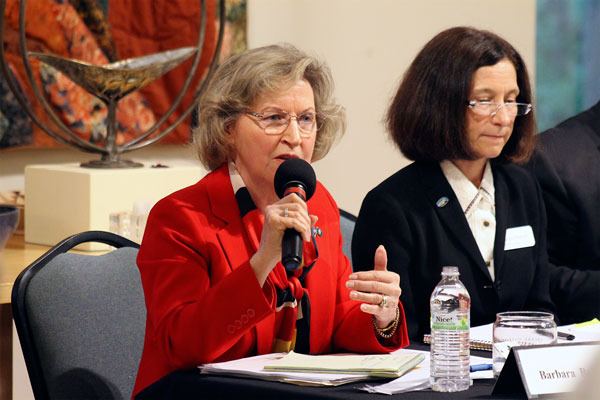A ban on assault weapons, global warming and funding for education were hot topics in the state senate race at a forum hosted by the League of Women Voters.
Held Thursday at Unitarian Universalist Church in Freeland, the event also included a question-and-answer period with Port of South Whidbey officials concerning the district’s proposal to become the new owners of the fairgrounds in Langley and assess a property tax increase to support the aging facility.
Democrat Angie Homola, vying for the 10th Legislative District’s Senate seat, was in favor of reinstating a ban on assault weapons, while incumbent Barbara Bailey, R-Oak Harbor, and challenger Democrat Nick Petrish would not support a ban.
Homola believes a ban on assault weapons is justified and that she would take pride in Washington becoming the first state in the nation to pass a universal background check requirement.
“Not only do I think that should happen at our local level and the state of Washington, but actually our nation,” she said. “I’m hoping we will get to that place. I don’t think it’s working. A lot of people are dying.”
Petrish felt the responsibility of issues with assault weapons falls on the shoulders of the shooters themselves and not the gun manufacturers. He did, however, support gun education and training and background checks. He said gun education could include 24-hour courses for a concealed weapons license, which would be broken down into three, eight-hour portions that would cover law, safety, gear selection, training and shooting range practice.
“Right now all you need is your fingerprints and a background check to get a concealed weapons license, and for me that’s not enough,” Petrish said. “If you’re going to carry a weapon in public, you better know the law and you better know when you’re going to be allowed to use that firearm.”
Bailey said the state does not currently allow for the purchase of assault weapons, and “tight” laws around permitting, particularly for concealed weapons, already exist. She felt the laws in place could be enforced better, but did not believe in more gun regulations beyond the ones already being implemented.

“We already have enough in place that we need to enforce and not bring about a lot of pressure on people who are already trying to follow the law,” Bailey said.
Asked if climate change is real, proven and human-caused, Homola and Petrish answered in the affirmative. Bailey said that while she believes climate change is real, she was unsure of its cause.
“I believe that climate change is real,” she said. “Now how that’s been caused, I’m not sure we have all the science there that would give one particular item that is causing it.”
The comment resulted in about a half dozen people in the 55-person audience chuckling loudly. Bailey responded by reaffirming her point and her intentions moving forward.
“You might disagree with me, you might disagree with the science that is still out there as to what exactly is going on,” Bailey said. “It doesn’t mean we’re ignoring it. We’re certainly looking at all the things we need to do.”
The trio varied in their proposed methodology of how to fund Washington State Supreme Court’s 2012 McCleary decision, a measure intended help fully fund K-12 public education by 2018.
Homola said that in order to fund the decision, efforts to close tax loopholes and implement tax reforms will need to be made. Petrish said a public banking system, closing corporate welfare and income tax that is proportionately fair for citizens of the state will help fund it.
Bailey said a plan is already in place to reach the supreme court’s measure and that education comprises more than half of the state’s current budget. She said one of her goals would be to avoid raising taxes in order to support the effort, adding that the economy is strong.
After roughly one hour with the state senate, the focus shifted to the Port of South Whidbey’s efforts to seek voter approval on transferring title of the fairgrounds in Langley from Island County to the port, while also increasing the district’s existing levy to fund ongoing maintenance. A successful ballot measure would increase the levy from about 13 cents to 18 cents per $1,000 of assessed value, which equates to approximately $15 per year for taxpayers.
Port of South Whidbey Commissioner Curt Gordon and Whidbey Island Fair Association member Gwendy Hastings, an advocate of the proposal, fielded questions about why the tax increase is justified, what effects the passage of the increase would have on continuing improvements to the Langley marina and how the Port will manage the fairgrounds for multiple uses beyond just the Whidbey Island Fair held every August.
“I really believe when it comes to the economic benefit of that facility the other 11 months outside of the fair, I think it’s going to be a very local benefit and local enough that we can offset that benefit by asking the folks locally to support that,” Gordon said.


